#MongoDB Professionals
Explore tagged Tumblr posts
Text
Hire Skilled MongoDB Professionals
Looking to leverage the power of MongoDB for your database needs? Look no further than OnGraph to hire skilled MongoDB professionals. Our dedicated experts are well-versed in harnessing MongoDB's flexibility and scalability to design and manage robust database solutions. Whether you need help with database design, migration, optimization, or maintenance, our team is ready to deliver top-notch MongoDB services.
0 notes
Text
Boost Your Business with Expert MongoDB Development Services
businesses require robust and efficient database solutions to manage and scale their data effectively. MongoDB, a high-end open source database platform, has emerged as a leading choice for organizations seeking optimal performance and scalability. This article delves into the comprehensive services offered by brtechgeeks for MongoDB development, highlighting its key features, advantages, and why it's the preferred choice for modern businesses.
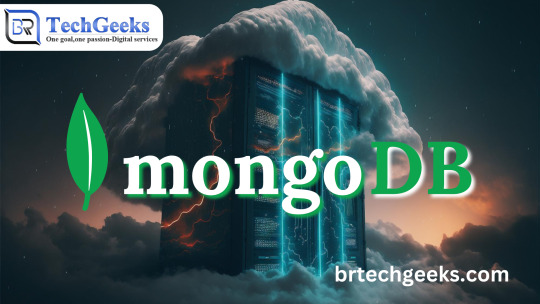
Technical Specifications
Database Type: NoSQL, document-oriented
Data Storage: BSON (Binary JSON)
Query Language: MongoDB Query Language (MQL)
Scalability: Horizontal scaling through sharding
Replication: Replica sets for high availability
Indexing: Supports various types of indexes, including single field, compound, geospatial, and text indexes
Aggregation: Powerful aggregation framework for data processing and analysis
Server Support: Cross-platform support for Windows, Linux, and macOS
Applications
MongoDB is versatile and can be utilized across various industries and applications:
E-commerce: Product catalogs, inventory management, and order processing
Finance: Real-time analytics, risk management, and fraud detection
Healthcare: Patient records, clinical data, and research databases
IoT: Device data storage, real-time processing, and analytics
Gaming: Player data, leaderboards, and in-game analytics
Benefits of Hiring brtechgeeks for MongoDB Development Services
Expertise in Ad hoc Queries: Our professionals possess extensive experience in handling ad hoc queries, ensuring flexible and dynamic data retrieval.
Enhanced Data Processing: Utilizing sharding and scalability techniques, we boost your data processing performance.
Improved Database Management: We enhance your database management system, ensuring efficient and effective data handling.
Complex Query Handling: By indexing on JSON data, we skillfully manage complex queries, improving performance and reliability.
24/7 Support: Our dedicated team works round the clock to provide optimum results and the best experience.
Request A Quote For MongoDB Development Services
Challenges and Limitations
While MongoDB offers numerous advantages, it also comes with certain challenges:
Data Modeling: Designing effective data models can be complex.
Memory Usage: MongoDB can be memory-intensive due to its in-memory data storage.
Security: Proper configuration is essential to ensure data security.
Latest Innovations
Recent advancements in MongoDB include:
MongoDB Atlas: A fully managed cloud database service
Multi-document ACID transactions: Ensuring data integrity across multiple documents
Enhanced Aggregation Framework: New operators and expressions for advanced data processing
Future Prospects
The future of MongoDB looks promising with continuous improvements and updates. Predictions include:
Increased Adoption: More businesses will adopt MongoDB for its scalability and performance.
Integration with AI and ML: Enhanced integration with artificial intelligence and machine learning for advanced analytics.
Improved Security Features: Continuous development of security features to protect data.
Comparative Analysis
Comparing MongoDB with other database technologies:
MongoDB vs. SQL Databases: MongoDB offers more flexibility with unstructured data compared to traditional SQL databases.
MongoDB vs. Cassandra: MongoDB provides a richer query language and better support for ad hoc queries than Cassandra.
MongoDB vs. Firebase: MongoDB offers better scalability and data modeling capabilities for complex applications.
User Guides or Tutorials
Setting Up MongoDB
Installation: Download and install MongoDB from the official website.
Configuration: Configure the MongoDB server settings.
Data Import: Import data using MongoDB's import tools.
Basic CRUD Operations
Create: Insert documents into a collection.
Read: Query documents using MQL.
Update: Modify existing documents.
Delete: Remove documents from a collection.
MongoDB stands out as a powerful, flexible, and scalable database solution, making it an excellent choice for businesses across various industries. By partnering with brtechgeeks, you can leverage expert MongoDB development services to enhance your data processing capabilities, ensure robust database management, and achieve optimal performance. Embrace MongoDB development to stay ahead in the competitive digital landscape.
For more information and to hire our MongoDB development services, visit us at brtechgeeks.
Related More Services
Website Design Services
Rapid Application Development
SaaS Software Services
About Us
BR TechGeeks was initiated in 2009 with a vision – to bring good technology and good relationships come together with collaboration. We are individuals with a passion for creativity and creativity makes us happy. We believe there is always a better way to bring your business online – whether it be a website or a mobile application. Not only do we stop there, we help get your business across to your customers. A creative use of technology can make complicated ideas more understandable and digital products
Contact Us
B-8 Basement, Sector- 2 Noida
U.P. India 201301
Call +91 7011 84 555 3
E-mail: [email protected]
#MongoDB download#MongoDB documentation#MongoDB Atlas#MongoDB Compass#MongoDB Community Server#MongoDB tutorial#MongoDB Sell#mongodb Development services#mongodb professional services#mongodb consulting services#mongodb pricing#mongodb pricing azure#azure pricing calculator#mongodb community server
0 notes
Text
Introduction to SkillonIT Learning Hub- Empowering Rural Talent With World-Class IT Skills
SkillonIT provides IN-Demand IT courses, connecting Rural talent with rewarding IT skills through affordable, accessible and career-focused education. with Guaranteed pathways to internship and high paying jobs, start with us and step into Opportunities at top Tech-leading Companies. Skillonit Learning Hub, located in Buldhana, Maharashtra, is a leading institute dedicated to equipping individuals with cutting-edge technology skills. With a mission to bridge the digital divide, the institute provides high-quality education in various IT and professional development domains. Skillonit focuses on practical, industry-oriented training, ensuring students gain the expertise needed to thrive in today’s competitive job market. The hub is committed to empowering rural talent and shaping the next generation of skilled professionals.

Courses Offered Skillonit Learning Hub offers a diverse range of courses tailored to industry demands, enabling students to master both technical and professional skills.
Blockchain Development — Smart Contracts (Solidity, Rust, Web3.js, Hardhat) — Blockchain Protocols (Ethereum, Solana, Binance Smart Chain, Fantom) — Decentralized Applications (DApps) Development
Front-End Development — HTML, CSS, JavaScript — Frameworks: React.js, Vue.js, Angular — Responsive Web Design & UI Frameworks (Bootstrap, Tailwind CSS)
Back-End Development — Server-side Programming (Node.js, Python, PHP, Java, .NET) — Database Management (MySQL, MongoDB, Firebase, PostgreSQL) — API Development (RESTful APIs, GraphQL, WebSockets)
Full-Stack Development — Front-End + Back-End Integration — MERN Stack Development — Database, Deployment & DevOps Practice
Mobile App Development — Cross-Platform Development (Flutter, React Native)
Unity 3D Game Development — Game Mechanics & Physics — C# Programming for Game Development — Virtual Reality (VR) & Augmented Reality (AR) Integration
Professional UI/UX Design — User Interface Design (Adobe XD, Figma, Sketch) — User Experience Principles — Prototyping, Wireframing & Usability Testing
Professional Graphic Design — Adobe Photoshop, Illustrator, and CorelDraw — Branding & Logo Design — Digital Art & Visual Communication
Digital Marketing — SEO, SEM, and Social Media Marketing — Content Marketing & Copywriting — Google Ads, Facebook Ads & Analytics
Spoken English — Communication Skills & Public Speaking — Accent Training & Fluency Improvement
Personality Development — Business & Corporate Etiquette — Confidence Building & Interview Preparation — Leadership & Teamwork Skills
Location & Contact : Address : Chhatrapati Tower, Above Maratha Mahila Urban, 3rd Floor, Chikhali Road, Buldhana, Maharashtra, 443001.
Contact us
Conclusion : Skillonit Learning Hub is revolutionizing IT and professional education by making technology and essential career skills accessible to aspiring developers, designers, marketers, and professionals. With a strong emphasis on practical learning, industry exposure, and career opportunities, it stands as a beacon of growth for young talent in Buldhana and beyond. Whether you are looking to build a career in tech, marketing, design, or personal development, Skillonit provides the ideal platform to achieve your goals. Join Our Social Community
Skillonit #Education #ITCourses #Buldhana #Maharashtra #IT #Blockchain #Fullstack #Front-end #Back-end #MobileApp #Unity3d #UIUX #Graphicdesign #Digitalmarketing #SpokenEnglish #Personality #development
2 notes
·
View notes
Text
What is Mern stack And Its importance? Before that I will Tell you the best institute for Mern stack course in Chandigarh.

What is Mern stack?
MERN Stack is a popular JavaScript-based technology stack used for building full-stack web applications. It consists of four key technologies:
MongoDB: A NoSQL database that stores data in a flexible, JSON-like format.
Express.js: A lightweight and fast backend framework for Node.js.
React.js: A front-end JavaScript library for building user interfaces.
Node.js: A runtime environment that allows JavaScript to run on the server side.
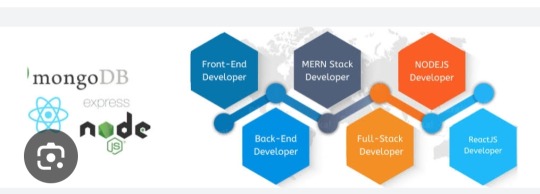
Importance of Mern Stack :
Full-Stack JavaScript – Uses JavaScript for frontend and backend, simplifying development.
High Performance – Node.js ensures fast, scalable applications.
Cost-Effective – Open-source, reducing development costs.
Rapid Development – React’s reusable components speed up UI building.
Flexibility – Suitable for web apps, SPAs, eCommerce, and real-time applications.
Scalability – MongoDB handles large data efficiently.
Strong Community Support – Large developer base ensures continuous updates and support.
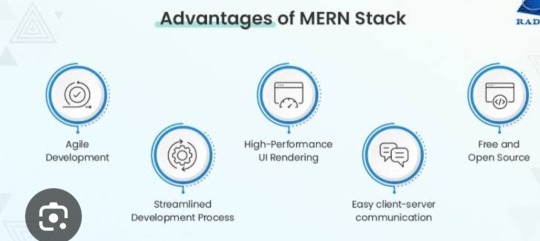
Now i will tell you the best institute for Mern stack course in Chandigarh .
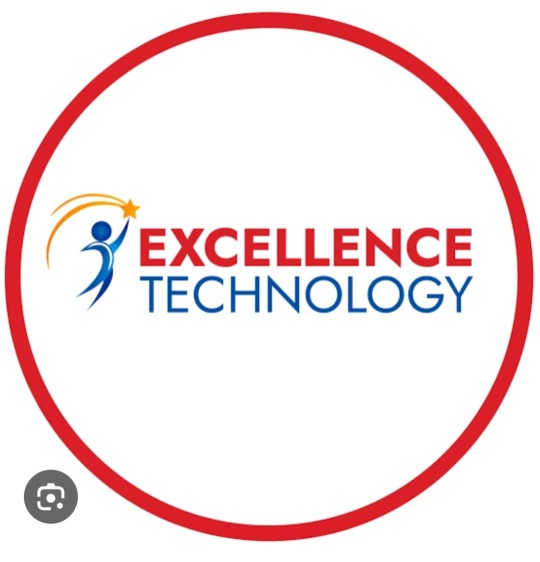
Excellence Technology is a leading EdTech (Educational technology) company dedicated to empowering individuals with cutting -edge IT skills and bridging the gap between education and industry demands. Specializing in IT training ,carrer development, and placement assistance ,the company equipts learners with the technical expertise and practical experience needed to thrive in today's competitive tech landscape. We provide IT courses like python ,Full stack Development, Web Design ,Graphic Design and Digital Marketing.
Contact Us for more details: 93177-88822
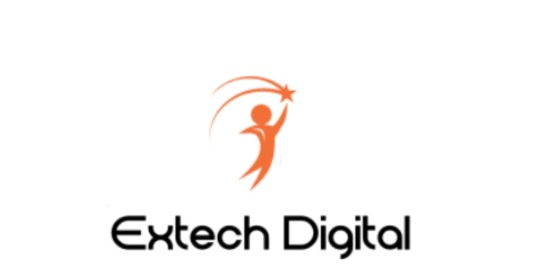
Extech Digital is a leading software development company dedicated to empowering individuals with cutting -edge IT skills and bridging the gap between education and industry demands. Specializing in IT training ,carrer development, and placement assistance ,the company equipt learners with the technical expertise and practical experience needed to thrive in today's competitive tech landscape. e provide IT courses like Python ,Full stack Development, Web Design ,Graphic Design and Digital Marketing.
Contact Us for more details: 93177-88822
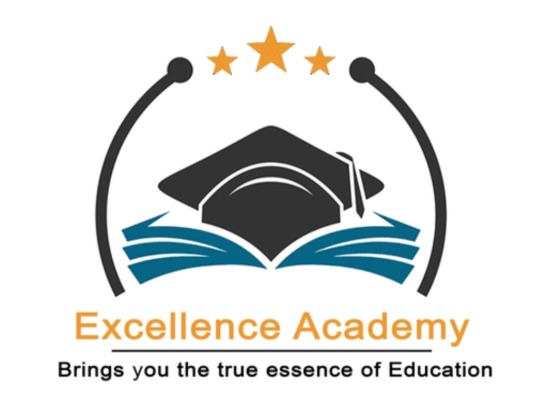
Excellence academy is a leading software development company dedicated to empowering individual with cutting edge IT skills and bridging the gap between education and industry demands.specializing in IT training, career development, and placement assistance, the company equits learners with the technical expertise and practical experience needed to thrive in today's landscape. We provide IT courses like python, full stack development,Web design, and Digital marketing.
Contact Us for more details: 93177-88822
About Author
Nikita Thakur
Mern stack AI Developer/ 2+ years of experience
Excellence technology
Professional summary
Nikita thakur is a skilled MERN Stack AI Developer with over 2 years of experience at Excellence Technology. Proficient in MongoDB, Express.js, React.js, and Node.js, she integrates AI solutions to build scalable, high-performance web applications. Nikita excels in developing innovative solutions, enhancing user experiences, and driving business growth through technology.
2 notes
·
View notes
Text
🚀 Professional MERN Stack Web Development Services | Build Your Dream Website Today!
Hey Tumblr's! 👋
Are you looking to bring your business ideas to life or take your website to the next level? Look no further! I’m a professional web developer specializing in MERN stack (MongoDB, Express.js, React, Node.js), offering full-service web development solutions tailored to your needs.
🌟 What I Offer:
Custom-built websites with React.js
Responsive design for all devices
E-commerce solutions
Single-page applications (SPA)
Backend development with Node.js & Express.js
Database management using MongoDB
API integrations
Secure and scalable websites
Whether you need a personal portfolio, business website, or an e-commerce platform, I can deliver a modern, high-performance website that stands out. I use the latest technologies to ensure your site is fast, reliable, and optimized for search engines (SEO).
🛠️ Why Choose Me?
Expert in MERN stack with years of experience
Client-focused approach – I listen to your needs
100% Responsive & SEO-friendly websites
Timely delivery and transparent communication
Let’s Chat! 💬
If you're ready to take your website to the next level or need help with an existing project, feel free to DM me or drop a comment below. I’d love to discuss your project and how I can help you achieve your goals!
Let’s build something amazing together! 🌐✨
3 notes
·
View notes
Text
Full Stack Testing vs. Full Stack Development: What’s the Difference?

In today’s fast-evolving tech world, buzzwords like Full Stack Development and Full Stack Testing have gained immense popularity. Both roles are vital in the software lifecycle, but they serve very different purposes. Whether you’re a beginner exploring your career options or a professional looking to expand your skills, understanding the differences between Full Stack Testing and Full Stack Development is crucial. Let’s dive into what makes these two roles unique!
What Is Full Stack Development?
Full Stack Development refers to the ability to build an entire software application – from the user interface to the backend logic – using a wide range of tools and technologies. A Full Stack Developer is proficient in both front-end (user-facing) and back-end (server-side) development.
Key Responsibilities of a Full Stack Developer:
Front-End Development: Building the user interface using tools like HTML, CSS, JavaScript, React, or Angular.
Back-End Development: Creating server-side logic using languages like Node.js, Python, Java, or PHP.
Database Management: Handling databases such as MySQL, MongoDB, or PostgreSQL.
API Integration: Connecting applications through RESTful or GraphQL APIs.
Version Control: Using tools like Git for collaborative development.
Skills Required for Full Stack Development:
Proficiency in programming languages (JavaScript, Python, Java, etc.)
Knowledge of web frameworks (React, Django, etc.)
Experience with databases and cloud platforms
Understanding of DevOps tools
In short, a Full Stack Developer handles everything from designing the UI to writing server-side code, ensuring the software runs smoothly.
What Is Full Stack Testing?
Full Stack Testing is all about ensuring quality at every stage of the software development lifecycle. A Full Stack Tester is responsible for testing applications across multiple layers – from front-end UI testing to back-end database validation – ensuring a seamless user experience. They blend manual and automation testing skills to detect issues early and prevent software failures.
Key Responsibilities of a Full Stack Tester:
UI Testing: Ensuring the application looks and behaves correctly on the front end.
API Testing: Validating data flow and communication between services.
Database Testing: Verifying data integrity and backend operations.
Performance Testing: Ensuring the application performs well under load using tools like JMeter.
Automation Testing: Automating repetitive tests with tools like Selenium or Cypress.
Security Testing: Identifying vulnerabilities to prevent cyber-attacks.
Skills Required for Full Stack Testing:
Knowledge of testing tools like Selenium, Postman, JMeter, or TOSCA
Proficiency in both manual and automation testing
Understanding of test frameworks like TestNG or Cucumber
Familiarity with Agile and DevOps practices
Basic knowledge of programming for writing test scripts
A Full Stack Tester plays a critical role in identifying bugs early in the development process and ensuring the software functions flawlessly.
Which Career Path Should You Choose?
The choice between Full Stack Development and Full Stack Testing depends on your interests and strengths:
Choose Full Stack Development if you love coding, creating interfaces, and building software solutions from scratch. This role is ideal for those who enjoy developing creative products and working with both front-end and back-end technologies.
Choose Full Stack Testing if you have a keen eye for detail and enjoy problem-solving by finding bugs and ensuring software quality. If you love automation, performance testing, and working with multiple testing tools, Full Stack Testing is the right path.
Why Both Roles Are Essential :
Both Full Stack Developers and Full Stack Testers are integral to software development. While developers focus on creating functional features, testers ensure that everything runs smoothly and meets user expectations. In an Agile or DevOps environment, these roles often overlap, with testers and developers working closely to deliver high-quality software in shorter cycles.
Final Thoughts :
Whether you opt for Full Stack Testing or Full Stack Development, both fields offer exciting opportunities with tremendous growth potential. With software becoming increasingly complex, the demand for skilled developers and testers is higher than ever.
At TestoMeter Pvt. Ltd., we provide comprehensive training in both Full Stack Development and Full Stack Testing to help you build a future-proof career. Whether you want to build software or ensure its quality, we’ve got the perfect course for you.
Ready to take the next step? Explore our Full Stack courses today and start your journey toward a successful IT career!
This blog not only provides a crisp comparison but also encourages potential students to explore both career paths with TestoMeter.
For more Details :
Interested in kick-starting your Software Developer/Software Tester career? Contact us today or Visit our website for course details, success stories, and more!
🌐visit - https://www.testometer.co.in/
2 notes
·
View notes
Text
Which is better full stack development or testing?
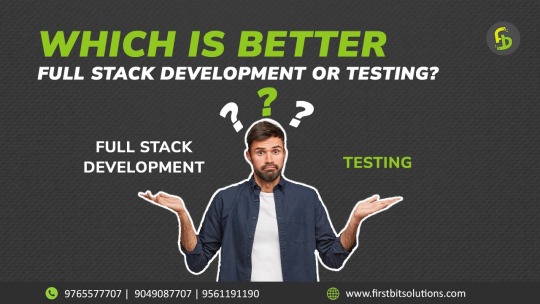
Full Stack Development vs Software Testing: Which Career Path is Right for You?
In today’s rapidly evolving IT industry, choosing the right career path can be challenging. Two popular options are Full Stack Development and Software Testing. Both of these fields offer unique opportunities and cater to different skill sets, making it essential to assess which one aligns better with your interests, goals, and long-term career aspirations.
At FirstBit Solutions, we take pride in offering a premium quality of teaching, with expert-led courses designed to provide real-world skills. Our goal is to help you know, no matter which path you choose. Whether you’re interested in development or testing, our 100% unlimited placement call guarantee ensures ample job opportunities. In this answer, we’ll explore both career paths to help you make an informed decision.
Understanding Full Stack Development
What is Full Stack Development?
Full Stack Development involves working on both the front-end (client-side) and back-end (server-side) of web applications. Full stack developers handle everything from designing the user interface (UI) to managing databases and server logic. They are versatile professionals who can oversee a project from start to finish.
Key Skills Required for Full Stack Development
To become a full stack developer, you need a diverse set of skills, including:
Front-End Technologies: HTML, CSS, and JavaScript are the fundamental building blocks of web development. Additionally, proficiency in front-end frameworks like React, Angular, or Vue.js is crucial for creating dynamic and responsive web interfaces.
Back-End Technologies: Understanding back-end programming languages like Node.js, Python, Ruby, Java, or PHP is essential for server-side development. Additionally, knowledge of frameworks like Express.js, Django, or Spring can help streamline development processes.
Databases: Full stack developers must know how to work with both SQL (e.g., MySQL, PostgreSQL) and NoSQL (e.g., MongoDB) databases.
Version Control and Collaboration: Proficiency in tools like Git, GitHub, and agile methodologies is important for working in a collaborative environment.
Job Opportunities in Full Stack Development
Full stack developers are in high demand due to their versatility. Companies often prefer professionals who can handle both front-end and back-end tasks, making them valuable assets in any development team. Full stack developers can work in:
Web Development
Mobile App Development
Enterprise Solutions
Startup Ecosystems
The flexibility to work on multiple layers of development opens doors to various career opportunities. Moreover, the continuous rise of startups and digital transformation initiatives has further fueled the demand for full stack developers.
Benefits of Choosing Full Stack Development
High Demand: The need for full stack developers is constantly increasing across industries, making it a lucrative career choice.
Versatility: You can switch between front-end and back-end tasks, giving you a holistic understanding of how applications work.
Creativity: If you enjoy creating visually appealing interfaces while also solving complex back-end problems, full stack development allows you to engage both creative and logical thinking.
Salary: Full stack developers typically enjoy competitive salaries due to their wide skill set and ability to handle various tasks.
Understanding Software Testing
What is Software Testing?
Software Testing is the process of evaluating and verifying that a software product or application is free of defects, meets specified requirements, and functions as expected. Testers ensure the quality and reliability of software by conducting both manual and automated tests.
Key Skills Required for Software Testing
To succeed in software testing, you need to develop the following skills:
Manual Testing: Knowledge of testing techniques, understanding different testing types (unit, integration, system, UAT, etc.), and the ability to write test cases are fundamental for manual testing.
Automated Testing: Proficiency in tools like Selenium, JUnit, TestNG, or Cucumber is essential for automating repetitive test scenarios and improving efficiency.
Attention to Detail: Testers must have a keen eye for identifying potential issues, bugs, and vulnerabilities in software systems.
Scripting Knowledge: Basic programming skills in languages like Java, Python, or JavaScript are necessary to write and maintain test scripts for automated testing.
Job Opportunities in Software Testing
As the demand for high-quality software increases, so does the need for skilled software testers. Companies are investing heavily in testing to ensure that their products perform optimally in the competitive market. Software testers can work in:
Manual Testing
Automated Testing
Quality Assurance (QA) Engineering
Test Automation Development
With the rise of Agile and DevOps methodologies, the role of testers has become even more critical. Continuous integration and continuous delivery (CI/CD) pipelines rely on automated testing to deliver reliable software faster.
Benefits of Choosing Software Testing
Job Security: With software quality being paramount, skilled testers are in high demand, and the need for testing professionals will only continue to grow.
Quality Assurance: If you have a knack for perfection and enjoy ensuring that software works flawlessly, testing could be a satisfying career.
Automated Testing Growth: The shift toward automation opens up new opportunities for testers to specialize in test automation tools and frameworks, which are essential for faster releases.
Flexibility: Testing provides opportunities to work across different domains and industries, as almost every software product requires thorough testing.
Full Stack Development vs Software Testing: A Comparative Analysis
Let’s break down the major factors that could influence your decision:
Factors
Full Stack Development
Software Testing
Skills
Proficiency in front-end and back-end technologies, databases
Manual and automated testing, attention to detail, scripting
Creativity
High – involves creating and designing both UI and logic
Moderate – focuses on improving software through testing and validation
Job Roles
Web Developer, Full Stack Engineer, Mobile App Developer
QA Engineer, Test Automation Engineer, Software Tester
Career Growth
Opportunities to transition into senior roles like CTO or Solution Architect
Growth towards roles in automation and quality management
Salary
Competitive with wide-ranging opportunities
Competitive, with automation testers in higher demand
Demand
High demand due to increasing digitalization and web-based applications
Consistently high, especially in Agile/DevOps environments
Learning Curve
Steep – requires mastering multiple languages and technologies
Moderate – requires a focus on testing tools, techniques, and automation
Why Choose FirstBit Solutions for Full Stack Development or Software Testing?
At FirstBit Solutions, we provide comprehensive training in both full stack development and software testing. Our experienced faculty ensures that you gain hands-on experience and practical knowledge in the field of your choice. Our 100% unlimited placement call guarantee ensures that you have ample opportunities to land your dream job, no matter which course you pursue. Here’s why FirstBit is your ideal training partner:
Expert Trainers: Learn from industry veterans with years of experience in development and testing.
Real-World Projects: Work on real-world projects that simulate industry scenarios, providing you with the practical experience needed to excel.
Job Assistance: Our robust placement support ensures you have access to job openings with top companies.
Flexible Learning: Choose from online and offline batch options to fit your schedule.
Conclusion: Which Career Path is Right for You?
Ultimately, the choice between full stack development and software testing comes down to your personal interests, skills, and career aspirations. If you’re someone who enjoys building applications from the ground up, full stack development might be the perfect fit for you. On the other hand, if you take satisfaction in ensuring that software is of the highest quality, software testing could be your calling.
At FirstBit Solutions, we provide top-notch training in both fields, allowing you to pursue your passion and build a successful career in the IT industry. With our industry-aligned curriculum, expert guidance, and 100% placement call guarantee, your future is in good hands.
So, what are you waiting for? Choose the course that excites you and start your journey toward a rewarding career today!
#education#programming#tech#technology#training#python#full stack developer#software testing#itservices#java#.net#.net developers#datascience
2 notes
·
View notes
Text
Jclicksolutions Launches MERN Stack Training in Nagercoil: Empowering Aspiring Full-Stack Developers
The demand for skilled web developers continues to rise as businesses across industries move online. To meet this growing need, Jclicksolutions is excited to offer an intensive MERN Stack training program in Nagercoil, providing aspiring developers and professionals with the essential skills to build full-stack web applications. This program focuses on the MERN Stack, a popular framework that uses JavaScript across both front-end and back-end development, making it an ideal solution for dynamic and scalable applications.
What is the MERN Stack?
The MERN Stack is a combination of four powerful technologies:
MongoDB: A NoSQL database, perfect for handling and managing large amounts of data with flexibility and ease.
Express.js: A fast and minimalist web framework for Node.js, used to build robust server-side applications.
React.js: A highly efficient JavaScript library developed by Facebook for creating interactive user interfaces.
Node.js: A runtime environment that allows JavaScript to be used for server-side scripting, enabling full-stack development using a single language.
The MERN Stack is one of the most sought-after development frameworks due to its versatility, scalability, and widespread use in the industry. Companies across the globe are adopting MERN Stack for building responsive and efficient web applications, creating a significant demand for developers proficient in this framework.
Why Choose Jclicksolutions in Nagercoil?
JClickSolutions is a leading IT training provider, known for delivering industry-relevant programs that prepare students for real-world challenges. The MERN Stack course in Nagercoil offers several unique benefits:
Comprehensive Curriculum: The course covers all core elements of the MERN Stack, providing in-depth training on MongoDB, Express, React, and Node.js. Participants will gain practical experience in front-end and back-end development, enabling them to build complete web applications from scratch.
Hands-on Learning: The training is project-based, giving students the opportunity to work on real-world applications. By building live projects, participants will develop practical skills and a strong portfolio that showcases their expertise.
Expert Instructors: Jclicksolutions' MERN Stack training is led by experienced developers with years of experience in full-stack development. They provide personalized guidance and mentorship, helping students understand the nuances of each technology.
Flexible Learning Options: The course offers flexible schedules, including both online and in-person classes, catering to students, working professionals, and tech enthusiasts. This allows participants to learn at their own pace while balancing other commitments.
Career Support: Jclicksolutions provides end-to-end career support, including resume building, interview preparation, and job placement assistance. Graduates of the MERN Stack program are well-prepared to enter the job market and secure positions in top tech companies.
The Growing Demand for MERN Stack Developers
The rise of web-based applications has increased the demand for full-stack developers proficient in frameworks like MERN. With companies looking for scalable, high-performance solutions, MERN Stack has become a go-to choice for building modern web applications. Learning the MERN Stack opens up numerous job opportunities, from startups to large enterprises.
Why Nagercoil?
As a growing tech hub, Nagercoil is witnessing increased investment in IT and software development sectors. Jclicksolutions' decision to offer MERN Stack training in Nagercoil comes at a perfect time, giving local talent the opportunity to develop skills without relocating to larger cities. The course provides a gateway to lucrative career options in web development, both locally and globally.
Conclusion
The MERN Stack training program at Jclicksolutions in Nagercoil is the perfect stepping stone for anyone looking to build a successful career in web development. With its industry-aligned curriculum, hands-on projects, and expert mentorship, participants will gain the skills and confidence needed to excel in today’s competitive tech landscape.
For more details or to register, visit www.jclicksolutions.in today!
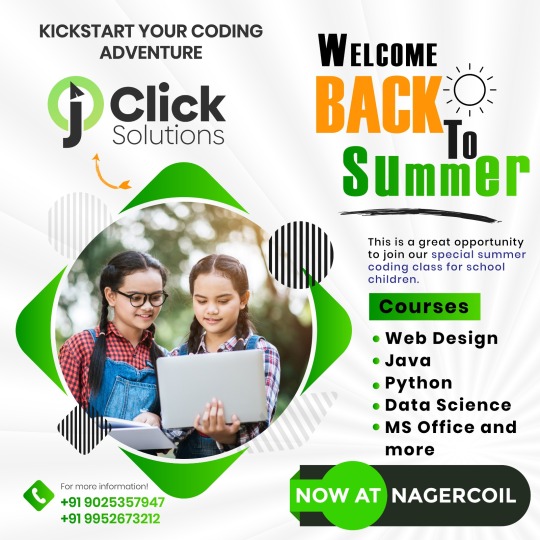
#MERN STACK in Nagercoil
#MERNSTACKinNagercoil
#Jclicksolutions
#JclicksolutionsMERNSTACKinNagercoil
2 notes
·
View notes
Text
Best of Web Development Courses: A Comprehensive Guide

Web development is a vital skill in today’s digital world. Whether you're aspiring to become a professional web developer or looking to enhance your skills, selecting the right web development course is crucial. With countless options available, it can be overwhelming to know where to start. This article provides a guide to the best web development courses available, helping you navigate through the top choices and find the one that suits your needs.
Why Take a Web Development Course?
Web development encompasses everything from creating basic websites to complex applications. The demand for skilled web developers is consistently high as businesses transition to digital platforms. By taking a web development course, you can:
Enhance your coding skills: Learn programming languages like HTML, CSS, JavaScript, and more.
Gain practical experience: Hands-on projects help you build a portfolio to showcase your skills.
Stay updated with industry trends: Modern courses keep you informed on the latest technologies and best practices.
Open career opportunities: Web development is a versatile field with various career paths such as front-end, back-end, or full-stack development.
Now, let’s dive into the top 10 web development courses that will give you the edge you need.
Top 10 Web Development Courses
The Web Developer Bootcamp – UdemyOverview: This course, created by Colt Steele, is one of the most popular web development bootcamps available. It covers everything from HTML, CSS, and JavaScript to more advanced topics like Node.js and Express.Why it stands out:
Over 63 hours of content.
Project-based learning with real-world applications.
Affordable pricing with regular discounts.
Ideal for: Beginners looking to get an in-depth introduction to web development.
Full-Stack Web Development with React – Coursera (offered by Hong Kong University of Science and Technology)Overview: This course focuses on the MERN stack (MongoDB, Express, React, Node). It's offered through Coursera by the Hong Kong University of Science and Technology, which gives it a reputable edge.Why it stands out:
Covers both front-end (React) and back-end development.
Offers a certificate from a prestigious institution.
Focuses on responsive web design.
Ideal for: Learners who want to focus on full-stack web development.
The Odin ProjectOverview: The Odin Project is a free, open-source curriculum that takes you through the entire web development process. It focuses on Ruby on Rails, JavaScript, and offers plenty of hands-on projects.Why it stands out:
Completely free with a community of learners.
Comprehensive learning paths from beginner to advanced.
Emphasizes practical projects.
Ideal for: Self-motivated learners looking for a free, community-driven option.
CS50’s Web Programming with Python and JavaScript – edX (Harvard University)Overview: CS50 is Harvard’s famous computer science course, and this specific track focuses on web programming. You’ll learn about Python, Django, JavaScript, and SQL through this rigorous program.Why it stands out:
Offered by Harvard University.
Covers complex web development topics such as Django and security.
Highly challenging, suitable for intermediate to advanced learners.
Ideal for: Developers with some background looking to dive deeper into web programming.
Complete Web Development Bootcamp – Udemy (Dr. Angela Yu)Overview: Dr. Angela Yu’s bootcamp is highly rated on Udemy for its engaging teaching style and comprehensive approach. You’ll learn HTML, CSS, JavaScript, Node.js, React, and even a little bit of web design.Why it stands out:
Over 55 hours of content.
Fun and engaging style with a focus on building projects.
Regularly updated to reflect the latest technologies.
Ideal for: Beginners who want to build a solid foundation in web development.
Responsive Web Design – freeCodeCampOverview: FreeCodeCamp is known for offering free, self-paced coding lessons, and its Responsive Web Design certification is one of the most popular. You’ll learn HTML5, CSS3, and responsive design principles.Why it stands out:
Free and self-paced.
300 hours of content including hands-on projects.
Community support and real-world project building.
Ideal for: Those looking for a free, structured way to learn responsive web design.
Zero to Mastery Complete Web Developer – Udemy (Andrei Neagoie)Overview: Andrei Neagoie’s course takes a hands-on approach to web development, covering everything from HTML and CSS to advanced topics like React and Node.js.Why it stands out:
Covers both front-end and back-end development.
Real-world projects like building a chat application.
Regularly updated to reflect industry changes.
Ideal for: Beginners to intermediate learners looking for comprehensive training.
Modern React with Redux – Udemy (Stephen Grider)Overview: React is one of the most in-demand front-end technologies today, and Stephen Grider’s course is perfect for those looking to specialize in it. This course covers React and Redux, focusing on building dynamic web applications.Why it stands out:
Specialized focus on React and Redux.
Project-based learning.
Great for intermediate learners.
Ideal for: Developers looking to specialize in React.
Learn Web Development – Mozilla Developer NetworkOverview: MDN’s web development course is a comprehensive, free resource that covers all aspects of web development. It’s created by the Mozilla Developer Network, known for its high-quality documentation.Why it stands out:
Free and constantly updated.
Covers the basics to advanced topics.
Reliable and well-documented resources.
Ideal for: Learners who prefer self-paced study with extensive documentation.
JavaScript, HTML, and CSS for Web Developers – Coursera (Johns Hopkins University)
Overview: This course, offered through Coursera by Johns Hopkins University, focuses on the fundamentals of JavaScript, HTML, and CSS, which are essential building blocks for any web developer.
Why it stands out:
Covers core web technologies.
Earn a certificate from a well-known university.
Focus on building real-world projects.
Ideal for: Beginners looking to get certified in web development fundamentals.
What to Look for in a Web Development Course
When choosing the best web development course for your needs, consider the following:
Skill Level: Are you a beginner or do you have some coding experience? Courses like The Odin Project and freeCodeCamp are great for beginners, while more advanced developers might prefer CS50’s Web Programming or Modern React with Redux.
Specialization: Do you want to focus on front-end (HTML, CSS, JavaScript), back-end (Node.js, Django), or full-stack development? Choose a course based on your career goals.
Project-Based Learning: A good web development course should include hands-on projects to help you apply what you've learned. The more projects, the better your portfolio will look to potential employers.
Certification: If you’re looking for recognition, consider courses that offer certificates from reputable institutions, like those from Coursera or edX.
Price: While some courses are free, others may require a one-time fee or subscription. Many platforms like Udemy offer discounts, so be sure to check regularly.
Final Thoughts
Whether you're just starting your journey in web development or looking to advance your skills, there’s a course out there for you. The best web development courses offer a blend of hands-on projects, updated content, and engaging instruction. As you consider the top 10 web development courses, think about your current skill level, your career aspirations, and your learning preferences. With the right course, you’ll be well on your way to becoming a proficient web developer.
Remember, learning web development is a marathon, not a sprint. Choose a course that fits your pace, stay consistent, and you'll see significant improvement in no time!
3 notes
·
View notes
Text
Transform Your Career with Our Live Full Stack MERN Course on StuIntern!
Are you eager to become a full-stack web developer and master the latest technologies? StuIntern.com is very thrilled to introduce our Live Full Stack MERN Developer Course crafted to equip you with the skills & the knowledge needed to excel in the tech industry. With a focus on hands-on learning & the real-world applications, this course is your gateway to becoming a proficient full-stack developer using the MERN stack.
Why Enroll in Our Live Full Stack MERN Course?
1. Comprehensive Curriculum: Our course covers the entire MERN stack—MongoDB, Express.js, React, and Node.js—ensuring you acquire a thorough understanding of how each of them function together. Some areas that would be covered include:
MongoDB: Learn to design & then manage databases using this powerful NoSQL database.
Express.js: Understand how to build scalable web applications & the APIs with this minimalist web framework for Node.js.
React: Master the art of creating dynamic & the responsive user interfaces with this popular JavaScript library.
Node.js: Gain expertise in server-side JavaScript and learn to create robust back-end solutions.
2. Expert Instructors: Our instructors are professionals from industry who have spent years of their lives acquiring deep technical knowledge as well as experience. This will enable them to give insights that are practical in nature so that you can know what best practices are as well as advanced techniques provided by actual experts.
3. Real-World Projects: With our project-based approach, put your skills into practice in real scenarios. This will involve working on practical assignments as well as building full-stack applications from scratch which will give you skills that are valuable in future employment opportunities.
4. Interactive Live Sessions: Our live classes offer an opportunity for direct communication between tutors and students. It aids instant feedback and dynamic discussions while deepening their understanding of complex concepts.
5. Affordable Pricing: At StuIntern.com, we believe quality education should be accessible. Our MERN Stack Development Course is priced competitively, offering exceptional value without compromising on content or support. Flexible payment options are available to suit your budget.
6. Lifetime Access: Enroll once and have lifetime access to everything including course session recordings, code samples, other resources etc. Get back at the material when you want or learn about stuff you missed earlier.
Course Highlights
Hands-On Learning: Build and deploy your own full-stack applications.
Expert Guidance: Receive mentorship and support from experienced developers.
Career Preparation: Gain practical skills and a portfolio of projects to showcase to potential employers.
Flexible Schedule: Join live sessions at times that fit your schedule, with recordings available for review.
How to Enroll
1. Visit StuIntern.com: Navigate to the MERN Stack Course page.
2. Select Your Plan: Choose the course package that aligns with your learning goals and budget.
3. Register Online: Fill out the registration form and complete your payment through our secure system.
4. Get Started: Receive all the necessary details to join live sessions and access course materials.
Don’t Wait—Transform Your Future Today!
Step forward in web development skill and create a path to a bright career with our Live MERN Stack Developer Course. Reserve your s-eat now because space is limited and start your journey to becoming an accomplished full-stack developer.
For further information, or to register go to StuIntern.com and take the first step in mastering the MERN stack.
StuIntern.com—Empowering Your Tech Career with Excellence!
4 notes
·
View notes
Text
Mastering the Art of Hiring MERN Stack Programmers: A Step-by-Step Guide
The MERN stack is a popular technology stack. It is an acronym that stands for MongoDB, Express.js, React, and Node.js. Each component of the MERN stack serves a specific purpose in the development process. MongoDB is a NoSQL database that stores data in a JSON-like format, making it flexible and scalable. Express.js is a web application framework for Node.js that provides a set of features for building web applications and APIs. React is a JavaScript library for building user interfaces, and it allows developers to create reusable UI components. Node.js is a server-side JavaScript runtime that allows developers to build scalable network applications. The MERN stack is known for its flexibility, efficiency, and performance. It allows developers to build full-stack applications using JavaScript, which makes the development process more streamlined and cohesive. Additionally, the MERN stack is well-suited for building real-time applications and single-page applications (SPAs). With its robust set of tools and technologies, the MERN stack has become a popular choice for businesses looking to develop modern, responsive web applications.
The Benefits of Hiring MERN Stack Programmers
Hiring MERN stack programmers can offer numerous benefits to businesses looking to develop web applications. MERN stack programmers are skilled in using MongoDB, Express.js, React, and Node.js to build dynamic and responsive web applications. They are proficient in JavaScript and have a deep understanding of the MERN stack architecture, making them valuable assets to any development team. MERN stack programmers are also well-versed in modern web development practices and can leverage the latest tools and technologies to build high-quality applications. They are capable of developing scalable and efficient web applications that can handle large amounts of data and traffic. Additionally, MERN stack programmers are adept at building real-time applications and SPAs, which are increasingly in demand in today's digital landscape. Furthermore, hiring MERN stack programmers can lead to faster development cycles and reduced time-to-market for web applications. Their expertise in the MERN stack allows them to build applications more efficiently, resulting in cost savings and improved productivity for businesses. Overall, hiring MERN stack programmers can provide businesses with the technical expertise and skills needed to develop modern, responsive web applications.
Where to Find Qualified MERN Stack Programmers
Finding qualified MERN stack programmers can be a challenging task, but there are several avenues businesses can explore to locate top talent. One option is to utilize online job boards and platforms specifically tailored to tech professionals, such as GitHub Jobs, Stack Overflow Jobs, and AngelList. These platforms allow businesses to post job listings and connect with experienced MERN stack programmers who are actively seeking new opportunities. Another option is to partner with specialized tech recruitment agencies that have access to a network of skilled MERN stack programmers. These agencies can help businesses identify and recruit top talent by leveraging their industry connections and expertise in the tech sector. Additionally, businesses can attend tech conferences, meetups, and networking events to connect with MERN stack programmers and build relationships within the tech community. Furthermore, businesses can explore freelance platforms such as Upwork and Toptal to find qualified MERN stack programmers who are available for short-term or project-based work. These platforms provide businesses with access to a global pool of tech talent and allow them to review portfolios and work samples before making hiring decisions. Overall, there are several avenues businesses can explore to find qualified MERN stack programmers, each with its own unique advantages and considerations.
How to Evaluate MERN Stack Programmers
Evaluating MERN stack programmers requires a comprehensive approach that takes into account their technical skills, experience, and cultural fit within the organization. One way to assess their technical proficiency is by conducting coding assessments or technical interviews that test their knowledge of JavaScript, MongoDB, Express.js, React, and Node.js. These assessments can help businesses gauge a candidate's ability to solve complex problems and write clean, efficient code using the MERN stack. Another important aspect to consider when evaluating MERN stack programmers is their experience with building real-world applications using the MERN stack. Reviewing their portfolio and work samples can provide insight into the quality of their previous projects and their ability to deliver high-quality web applications. Additionally, businesses can ask candidates about their experience with specific tools and technologies within the MERN stack, such as Redux for state management in React applications or Mongoose for interacting with MongoDB. Cultural fit is also an important factor to consider when evaluating MERN stack programmers. Businesses should assess a candidate's communication skills, teamwork abilities, and willingness to learn and adapt within a dynamic development environment. Conducting behavioral interviews or team-based exercises can help businesses gauge a candidate's interpersonal skills and how well they align with the company's values and culture. Overall, evaluating MERN stack programmers requires a holistic approach that considers their technical skills, experience, and cultural fit within the organization.
Interviewing MERN Stack Programmers
Interviewing MERN stack programmers requires careful preparation and consideration of the specific skills and qualities needed for the role. One approach is to conduct technical interviews that assess a candidate's knowledge of JavaScript, MongoDB, Express.js, React, and Node.js. These interviews can include coding exercises, problem-solving scenarios, or discussions about best practices for building web applications using the MERN stack. Another important aspect of interviewing MERN stack programmers is assessing their experience with building real-world applications and their ability to work within a team environment. Asking candidates about their previous projects, challenges they faced, and how they collaborated with other team members can provide insight into their practical skills and teamwork abilities. Additionally, businesses can use behavioral interviews to assess a candidate's communication skills, problem-solving abilities, and how well they align with the company's values and culture. Furthermore, businesses should consider conducting interviews that focus on specific tools and technologies within the MERN stack, such as Redux for state management in React applications or Mongoose for interacting with MongoDThese interviews can help businesses gauge a candidate's depth of knowledge in key areas of the MERN stack and their ability to leverage these tools effectively in real-world scenarios. Overall, interviewing MERN stack programmers requires a comprehensive approach that assesses their technical skills, practical experience, and cultural fit within the organization.
Onboarding MERN Stack Programmers
Onboarding MERN stack programmers is an important process that sets the stage for their success within the organization. One approach is to provide them with comprehensive training on the specific tools and technologies within the MERN stack, such as Redux for state management in React applications or Mongoose for interacting with MongoDThis training can help new hires become familiar with the company's development environment and best practices for building web applications using the MERN stack. Another important aspect of onboarding MERN stack programmers is integrating them into the development team and providing opportunities for collaboration and knowledge sharing. Pairing new hires with experienced team members or mentors can help them acclimate to the company's culture and development processes while also providing them with valuable guidance and support as they ramp up on new projects. Furthermore, businesses should consider providing new hires with access to resources such as documentation, code repositories, and development tools that will help them navigate their day-to-day responsibilities more effectively. This can include access to internal wikis or knowledge bases that contain information about the company's development processes, coding standards, and best practices for working with the MERN stack. Overall, onboarding MERN stack programmers requires a thoughtful approach that provides them with the training, support, and resources needed to succeed within the organization.
Retaining MERN Stack Programmers
Retaining MERN stack programmers requires ongoing efforts to support their professional growth, provide meaningful work opportunities, and foster a positive work environment. One approach is to offer professional development opportunities such as training programs, workshops, or certifications that allow MERN stack programmers to expand their skills and stay current with industry trends. This can help them feel valued within the organization and provide them with opportunities for career advancement. Another important aspect of retaining MERN stack programmers is providing them with challenging and meaningful work that allows them to leverage their skills and contribute to impactful projects. Offering opportunities for ownership over projects or involvement in decision-making processes can help keep MERN stack programmers engaged and motivated within their roles. Furthermore, fostering a positive work environment that values open communication, collaboration, and work-life balance can contribute to higher job satisfaction among MERN stack programmers. Providing opportunities for team-building activities, social events, or flexible work arrangements can help create a supportive and inclusive culture that encourages retention. Overall, retaining MERN stack programmers requires ongoing efforts to support their professional growth, provide meaningful work opportunities, and foster a positive work environment that values their contributions. By investing in their development and well-being, businesses can increase retention rates among their MERN stack programmers and build a strong foundation for long-term success within their development teams.
2 notes
·
View notes
Text
Unlocking Full-Stack Development: A Comprehensive Roadmap for Aspiring Developers in India
In the era of digital transformation, the demand for skilled full-stack developers in India is soaring. These versatile professionals proficient in both frontend and backend development are essential for building dynamic web applications. If you're aspiring to become a full-stack developer in India, this comprehensive roadmap will guide you through the steps to achieve your goal.

1. Grasp the Essentials of Web Development: To kickstart your journey as a full-stack developer, begin by mastering the core concepts of web development. Dive into HTML, CSS, and JavaScript—the fundamental languages for creating web pages. Understanding these basics lays a solid foundation for your future endeavors.
2. Select a Backend Language and Framework: Once you're comfortable with frontend technologies, delve into backend development by choosing a programming language and framework. Options like Python with Django, JavaScript with Node.js, or Ruby with Ruby on Rails are popular choices. These backend technologies empower you to handle server-side logic and data management efficiently.
3. Acquire Proficiency in Database Management: Database management is a critical aspect of full-stack development. Familiarize yourself with database systems such as MySQL, PostgreSQL, or MongoDB. Learn database querying, indexing, and normalization to effectively store and retrieve data for your web applications.
4. Explore Frontend Frameworks and Libraries: Enhance your frontend development skills by mastering popular frameworks and libraries. React.js, Angular, and Vue.js are widely used for building dynamic user interfaces. Dive deep into these tools to create interactive components and manage application state seamlessly.
5. Embrace Version Control Systems: Version control is indispensable for collaborative software development. Get hands-on experience with Git and platforms like GitHub or GitLab. Learn to create repositories, commit changes, and collaborate with other developers to streamline your workflow.
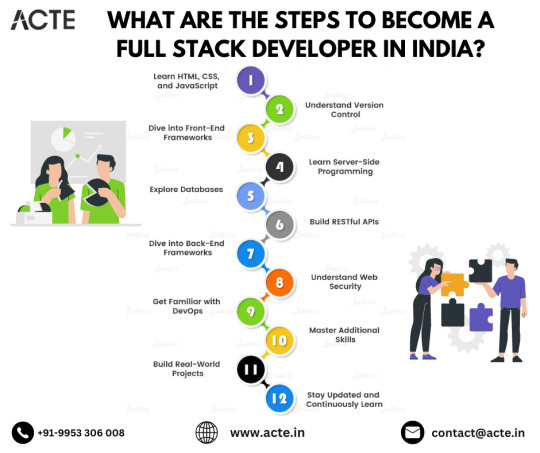
6. Sharpen Your Problem-Solving Skills: Problem-solving is a core competency for any developer. Practice solving coding challenges and algorithms on platforms such as LeetCode, HackerRank, or CodeSignal. Strengthening your problem-solving abilities will prepare you for technical interviews and real-world coding scenarios.
7. Develop Projects and Build a Portfolio: Apply your knowledge by working on diverse projects that showcase your full-stack development skills. Start with simple projects and gradually tackle more complex ones to demonstrate your proficiency. Create a portfolio website to exhibit your projects, expertise, and accomplishments to potential employers.
8. Stay Abreast of Industry Trends: The tech landscape evolves rapidly, so it's crucial to stay updated with the latest trends and technologies. Attend tech meetups, workshops, and conferences to network with industry professionals and learn from their experiences. Follow influential blogs, podcasts, and social media channels to stay informed about emerging trends and best practices.
9. Pursue Internship Opportunities: Internships provide invaluable hands-on experience and exposure to real-world projects. Look for internship opportunities at companies or startups where you can apply your skills in a professional environment. Internships also offer opportunities for mentorship and networking, which can be invaluable for your career growth.
10. Cultivate a Continuous Learning Mindset: Becoming a full-stack developer is a journey of lifelong learning and growth. Stay curious, explore new technologies, and continuously expand your skill set. Be open to adapting to new challenges and opportunities as they arise, and embrace a growth mindset to thrive in the ever-evolving tech industry.
Conclusion: Mastering full-stack development in India requires dedication, perseverance, and a commitment to lifelong learning. By following this comprehensive roadmap, you can acquire the skills and knowledge needed to excel in this dynamic and rewarding field. So, roll up your sleeves, embark on your full-stack development journey, and unlock a world of endless possibilities in India's thriving tech ecosystem.
#full stack developer#information#education#front end development#full stack web development#full stack developer course#frameworks#backend#technology#web development
2 notes
·
View notes
Text
Python FullStack Developer Jobs

Introduction :
A Python full-stack developer is a professional who has expertise in both front-end and back-end development using Python as their primary programming language. This means they are skilled in building web applications from the user interface to the server-side logic and the database. Here’s some information about Python full-stack developer jobs.
Job Responsibilities:
Front-End Development: Python full-stack developers are responsible for creating and maintaining the user interface of a web application. This involves using front-end technologies like HTML, CSS, JavaScript, and various frameworks like React, Angular, or Vue.js.
Back-End Development: They also work on the server-side of the application, managing databases, handling HTTP requests, and building the application’s logic. Python, along with frameworks like Django, Flask, or Fast API, is commonly used for back-end development.
Database Management: Full-stack developers often work with databases like PostgreSQL, MySQL, or NoSQL databases like MongoDB to store and retrieve data.
API Development: Creating and maintaining APIs for communication between the front-end and back-end systems is a crucial part of the job. RESTful and Graph QL APIs are commonly used.
Testing and Debugging: Full-stack developers are responsible for testing and debugging their code to ensure the application’s functionality and security.
Version Control: Using version control systems like Git to track changes and collaborate with other developers.
Deployment and DevOps: Deploying web applications on servers, configuring server environments, and implementing continuous integration/continuous deployment (CI/CD) pipelines.
Security: Ensuring the application is secure by implementing best practices and security measures to protect against common vulnerabilities.
Skills and Qualifications:
To excel in a Python full-stack developer role, you should have the following skills and qualifications:
Proficiency in Python programming.
Strong knowledge of front-end technologies (HTML, CSS, JavaScript) and frameworks.
Expertise in back-end development using Python and relevant web frameworks.
Experience with databases and data modeling.
Knowledge of version control systems (e.g., Git).
Familiarity with web servers and deployment.
Understanding of web security and best practices.
Problem-solving and debugging skills.
Collaboration and teamwork.
Continuous learning and staying up to date with the latest technologies and trends.
Job Opportunities:
Python full-stack developers are in demand in various industries, including web development agencies, e-commerce companies, startups, and large enterprises. Job titles you might come across include Full-Stack Developer, Python Developer, Web Developer, or Software Engineer.
The job market for Python full-stack developers is generally favorable, and these professionals can expect competitive salaries, particularly with experience and a strong skill set. Many companies appreciate the versatility of full-stack developers who can work on both the front-end and back-end aspects of their web applications.
To find Python full-stack developer job opportunities, you can check job boards, company career pages, and professional networking sites like LinkedIn. Additionally, you can work with recruitment agencies specializing in tech roles or attend tech job fairs and conferences to network with potential employers.
Python full stack developer jobs offer a range of advantages to those who pursue them. Here are some of the key advantages of working as a Python full stack developer:
Versatility: Python is a versatile programming language, and as a full stack developer, you can work on both front-end and back-end development, as well as other aspects of web development. This versatility allows you to work on a wide range of projects and tasks.
High demand: Python is one of the most popular programming languages, and there is a strong demand for Python full stack developers. This high demand leads to ample job opportunities and competitive salaries.
Job security: With the increasing reliance on web and mobile applications, the demand for full stack developers is expected to remain high. This job security provides a sense of stability and long-term career prospects.
Wide skill set: As a full stack developer, you gain expertise in various technologies and frameworks for both front-end and back-end development, including Django, Flask, JavaScript, HTML, CSS, and more. This wide skill set makes you a valuable asset to any development team.
Collaboration: Full stack developers often work closely with both front-end and back-end teams, fostering collaboration and communication within the development process. This can lead to a more holistic understanding of projects and better teamwork.
Problem-solving: Full stack developers often encounter challenges that require them to think critically and solve complex problems. This aspect of the job can be intellectually stimulating and rewarding.
Learning opportunities: The tech industry is constantly evolving, and full stack developers have the opportunity to continually learn and adapt to new technologies and tools. This can be personally fulfilling for those who enjoy ongoing learning.
Competitive salaries: Python full stack developers are typically well-compensated due to their valuable skills and the high demand for their expertise. Salaries can vary based on experience, location, and the specific organization.
Entrepreneurial opportunities: With the knowledge and skills gained as a full stack developer, you can also consider creating your own web-based projects or startup ventures. Python’s ease of use and strong community support can be particularly beneficial in entrepreneurial endeavors.
Remote work options: Many organizations offer remote work opportunities for full stack developers, allowing for greater flexibility in terms of where you work. This can be especially appealing to those who prefer a remote or freelance lifestyle.
Open-source community: Python has a vibrant and active open-source community, which means you can easily access a wealth of libraries, frameworks, and resources to enhance your development projects.
Career growth: As you gain experience and expertise, you can advance in your career and explore specialized roles or leadership positions within development teams or organizations.
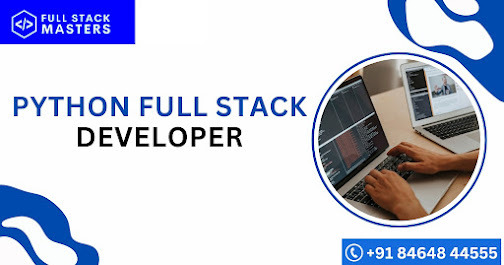
Conclusion:
Python full stack developer jobs offer a combination of technical skills, career stability, and a range of opportunities in the tech industry. If you enjoy working on both front-end and back-end aspects of web development and solving complex problems, this career path can be a rewarding choice.
Thanks for reading, hopefully you like the article if you want to take Full stack master's course from our Institute, please attend our live demo sessions or contact us: +918464844555 providing you with the best Online Full Stack Developer Course in Hyderabad with an affordable course fee structure.
2 notes
·
View notes
Text
professional python web development
Specialising in secure, scalable, and long-lasting web applications, professional Python web development leverages the Python programming language and related frameworks. This is a succinct overview of expert Python web development:
Python Language: When creating online applications, Python is a flexible and readable programming language. Its readability and simplicity are well known, and these qualities help with effective coding.
Frameworks: Django and Flask are two strong frameworks that offer an organised method for creating online applications, and Python web development frequently makes use of them. For quick development, Django, for instance, provides a thorough and authoritative framework.
Database integration is the process by which Python web developers handle data in online applications using a variety of databases, including PostgreSQL, MySQL, and NoSQL databases like MongoDB.
2 notes
·
View notes
Text
Become a Full-Stack Web Developer with just ONE course. HTML, CSS, Javascript, Node, React, MongoDB, Web3 and DApps
Ce que vous apprendrez
Build 16 web development projects for your portfolio, ready to apply for junior developer jobs.
Learn the latest technologies, including Javascript, React, Node and even Web3 development.
After the course you will be able to build ANY website you want.
Build fully-fledged websites and web apps for your startup or business.
Work as a freelance web developer.
Master frontend development with React
Master backend development with Node
Learn professional developer best practices.
Ce cours comprend :
Vidéo à la demande de 65,5 heures
7 exercices de codage
71 articles
102 ressources téléchargeables
1 note
·
View note
Text
Best web development course in jalandhar
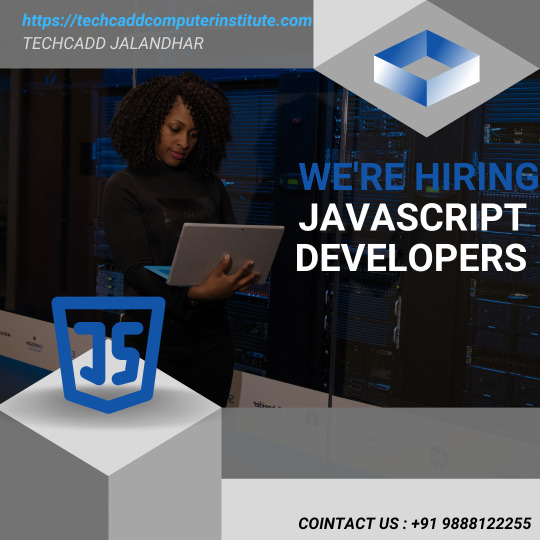
Best Web Development Course in Jalandhar: Boost Your Career with Expert Training With the modern digital era, learning web development has become a much-desired skill. Whether you want to develop interactive websites, design interactive user experiences, or create robust web applications, a professional course in web development can guide you towards success. For individuals in Punjab looking to venture into this field, the web development course in Jalandhar provides a great platform to learn from experienced professionals and acquire hands-on training that can make you stand out in the professional arena. Why a Web Development Course? Web development is a growing industry with regular demand from all industries. All businesses, big or small, need websites and web applications to communicate with their audiences effectively. By joining an extensive web development course, you acquire the skills in HTML, CSS, JavaScript, backend stacks, databases, and frameworks that employers seek. These courses also make you learn responsive design, SEO basics, and current industry trends so that you are up to date. What Makes the Web Development Course in Jalandhar Unique? Jalandhar, as an emerging IT hub, is home to numerous training schools, but few offer comprehensive, hands-on learning experiences. The top web development course in Jalandhar is structured to be a blend of theory and hands-on project work, enabling learners to develop actual-world websites and apps from the ground up. The experiential learning strategy enables the learners to develop confidence and refine their problem-solving skills. Here, courses are regularly updated to incorporate the latest web technologies such as React, Angular, Node.js, and so on. Moreover, industry-experienced professional trainers take students through every step, offering one-to-one mentorship and career guidance. Course Curriculum and Covered Skills A standard web development course in Jalandhar encompasses: Frontend Development: HTML5, CSS3, JavaScript, Bootstrap, and frameworks such as React or Angular. Backend Development: Server-side coding with Node.js, PHP, Python, or Java. Database Management: Handling SQL and NoSQL databases using MySQL and MongoDB. Version Control: Utilizing Git and GitHub for collaborative development. Deployment and Hosting: Registering domains, managing hosting services, and launching websites live. Project Work: Real projects to develop portfolios that best demonstrate your abilities to potential employers. Career Opportunities After Completing the Course With the solid groundwork laid by the top web development course in Jalandhar, students can choose to pursue a career as a Frontend Developer, Backend Developer, Full-Stack Developer, UI/UX Designer, or even go on to freelance. The need for talented web developers is immense, both domestically and internationally, making it a promising career path for one who is technology-savvy. Moreover, many training institutes assist with job placements, internships, and interview preparation, boosting your chances of landing a rewarding job. Why TechCADD is a Top Choice for Web Development Training in Jalandhar Among the numerous options, TechCADD is a top training institute that provides a well-designed web development course in Jalandhar. The course curriculum is industry-relevant, emphasis on latest technologies and real-world exposure. The students are provided with flexible class schedules, batch sizes, and post-training support, including clearing doubts and placement services. Final Thoughts Selecting the ideal web development course is important for achieving a successful career in technology. For prospective students in Punjab, enrolling in a well-known web development course in Jalandhar such as the one by TechCADD can speed up learning and provide opportunities for great jobs. Begin today and become a proficient web developer poised to succeed in the digital age.
0 notes